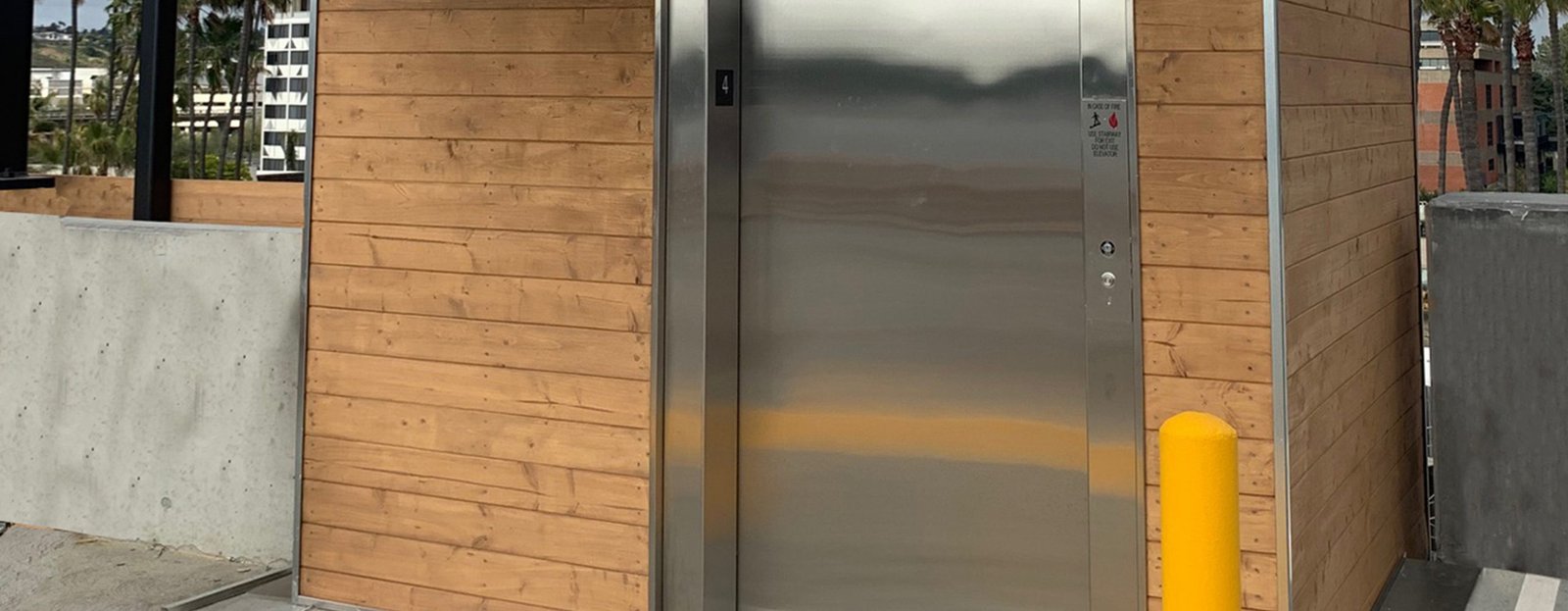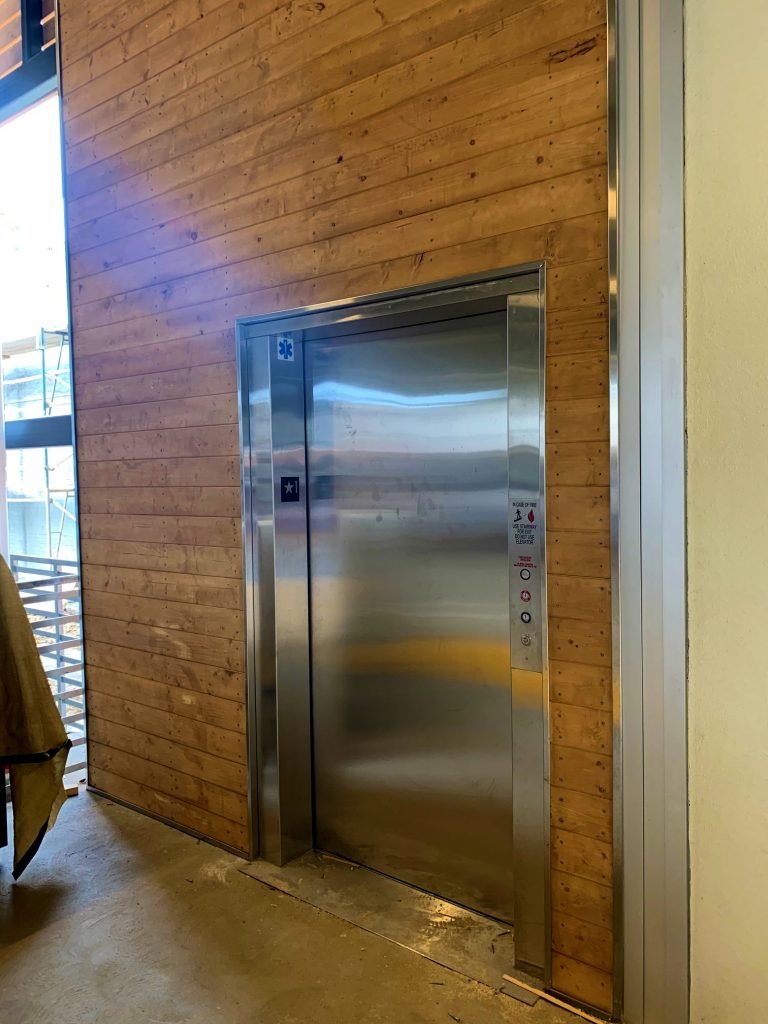


Parking Structures – Modular Elevators Meet Demand – Getting ahead of the curve is important in any construction development or building project. Depending on the particular area and whether you are talking about urban or suburban parking, current trends are moving toward slowing the creation of new parking spaces overall.
Some developers, seeing the possibility of lessening demand, have engineered the possibility of future alternative uses into their parking garage design. Incorporating elements like increased headroom and eliminating the slopped floors, in an effort to create a “flexible use” structure.
They attribute the burgeoning drift to many factors. It is anticipated that the Millennial generation’s reduced desire to own personal vehicles, expanding ride sharing opportunities, increasing focus on public transportation and the promise of self-driving cars will reduce the need for the overall amount of dedicated parking space.
With the current climate, are we on the cusp of urgently needing more parking despite the apparent trends listed above?
With the current outbreak of Covid-19 and its ability to be transmitted in many urban settings and dealing with abuse of public transit by the homeless population, some are re-examining personal transportation as a growing alternative. Public transportation being a germ factory is not new despite this particular strain of the Corona Virus. In the 2008/2009 flu season in London a study was conducted by BMC Infectious Diseases seeking to answer the question, “Is public transport a risk factor for acute respiratory infection?” The answer from the report is, “Recent bus or tram use within five days of symptom onset was associated with an almost six-fold increased risk of consulting for acute respiratory infections.” In a nutshell public transportation seems to increase transmission of viruses.
Really? They needed a study for that? So if reduced public transportation occurs the need for efficient, fast, multi-level parking development in both the urban and suburban areas is or will shortly be needed. Personal car use may rise and parking needs increase.
Keep in mind that with parking, it is not about the overall spaces. It is about where the spaces are. We have plenty of parking spaces in the United States. About 500 million parking spaces (an estimated 3,590 square miles) serve this nation of nearly 326 million people, according to Andy Cohen, co-chief executive of the architecture firm Gensler. He predicts car ownership will peak around 2020 and then start to decline, with more Americans relying on some form of ride-sharing rather than owning their own vehicles by the year 2025.
That was before the Corona Virus stole headlines and people’s lives. Before comfort levels with ride sharing and public transportation began changing. Ride sharing, when analyzing the data, may not be the panacea some had predicted to alleviate long-term parking woes.
Just prior to the virus’ big splashy headlines and justified concerns Bruce Schaller, New York City transportation consultant, saw parking trends differently from others by examining actual car ownership. In his report The New Automobility he concluded that ride sharing has had the opposite effect intended and promised by many. He said, “vehicle ownership has increased in cities where Uber and Lyft are most heavily used…Moreover, the rate of vehicle growth substantially exceeded population growth in five of the eight cities (Boston, Los Angeles, New York, Philadelphia and Chicago).”
Then we get to the virus and it is not just paranoia. Consumer Reports as of May 8th, 2020 acknowledges problems with public transportation, ride sharing and taxi cabs regarding possible transmission. The list of suggested ways to avoid the virus when traveling includes renting a car and then cleaning it yourself, always wearing a mask when driving or riding, requesting only vehicles with glass separating the passengers from drivers or even just packing sneakers and walking. Not very practical. Besides, how do you clean your rented car before driving it?
So with car ownership on the rise despite other alternatives, and virus fears in the forefront of people’s minds, it seems that the need for multi-level parking will not stay flat or decrease but only increase in years to come. Not the predicted result many futurists had hoped for. Now to be clear there is nothing wrong with designing parking space that can be more easily repurposed or adapted in the future. That makes perfect sense especially when considering self-driving cars that can park themselves inches apart requiring less space. Although not a reality today, it may be within the life span of a building project. Forward thinking is important.
However, there will be a new normal when it comes to transportation and thereby parking space. The solution will eventually evolve, but parking will not diminish in the near future. One thing is for sure, the data reveals that car ownership is not subsiding due to ride sharing options and with “social distancing” becoming a standard phrase in our lexicon the mentality of individual travel or traveling as a family unit may become more of the norm, not less as anticipated. You may need more parking solutions faster.
So why is the modular elevator part of the parking solution for projects today and the possible increased projects soon to come? Because they are high-quality, commercial elevators that are durable and have elements specifically designed for parking structures. They also have pre-engineered drawings that can be inserted into plans, manufactured and trucked to the job site and installed.



Modular Elevator Manufacturing removes elevators from the critical path and reduces the headaches of coordination between trades. They are a solution for any low or mid-rise parking structure. If you have a current project for a parking structure or any other building between two and seven stories just click the button below to get a Fast Track budget number.
Never miss a blog post again. Sign up for our monthly email newletter. Get important information about elevators, the modular industry and more.
